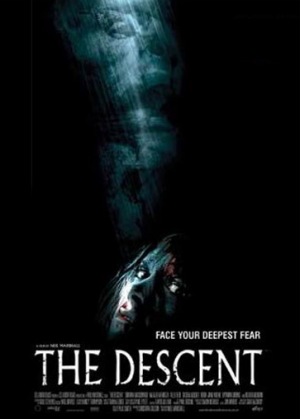As I watched The Descent for a second time, the one thought to which I kept returning was this:
Maybe there are some places humanity just doesn’t need to go.
For sure, the movies keep trying to make the case. In the movies, if you go into the ocean, into the woods, into space, you’re probably going to have one hell of a hard time and you may not survive the experience. To that list of unwelcoming locations, we can add caves, thanks to The Descent. We just don’t need to go into caves, people! We’re not bears. The reason we have cities and suburbs is so we don’t have to go to caves, space, the woods, or the ocean. I don’t mean to be a party pooper, but what’s wrong with just staying home?
The Descent is about six women who don’t ask themselves that question. The main protagonist, Sarah, experiences a horrific loss in a traffic accident in which she is the only survivor. As she recovers, she is plagued with upsetting visions. A year later, she is invited by five of her friends on a wilderness expedition, nominally on her behalf. The idea is a bonding experience that will reintroduce the thrill of life to her scarred psyche. In a colossally unwise choice, the women elect to descend into a remote cave of unknown depth. Their entryway collapses in a rockslide and they are forced to search out another exit, if there even is one. Not only that, but there’s something hungry down there with them.
As much as I enjoy Dog Soldiers, The Descent is a remarkable development for British writer-director Neil Marshall. He stepped up his game in every way, technically speaking – the crystal-clear cinematography is sharper and smoother, the music is more affecting, and the tension is heavier, almost intolerable. The performances of all six women are effective, though I’ve not heard of any of them before or since. That makes it tough at times to keep track of them, especially when they get separated. I do wonder if it would have altered things in any way if there were a couple recognizable faces in the small cast.
Using known actors is a double-edged sword for horror filmmakers; on one hand it can more immediately align the audience with a sympathetic character so that you worry more for their safety, but on the other hand it provides the audience with a sense of security that works against a horror movie. (It’s rare that most movies will kill off their biggest names.) Ultimately, I think the casting worked as intended, because all of the women are believable enough that you want them to make it out of there alive. It helps that the cast is all female – I’m sorry if it sounds like reverse-chauvinism, but it’s much more upsetting to see women in hopeless danger than men.
Without a doubt, The Descent is one of the best horror movies of the past decade. The underground creatures are disturbing and fearsome – that is, when they finally show up. Marshall takes a big risk that pays off wonderfully, by withholding the creatures for as long as he does. If you didn’t know ahead of time that this is a monster movie, you would be entirely bushwhacked when they show up a full hour into the movie. But even knowing it ahead of time, the slow build makes it just as shocking. Long before the monsters show up, the movie is effectively suspenseful. The set design and cinematography conjur a dark and dank and totally foreign landscape underground (this could not have been a fun shoot), and I really can’t stress this last thought enough: This movie is NOT for claustrophobics.
It would be hard for a fan of genre movies not to be excited by the promise of Neil Marshall’s career. From the genres he has chosen to work in (even by the credits font of The Descent), it’s clear that he takes inspiration from the great John Carpenter. On the evidence of the one-two punch of Dog Soldiers and The Descent, he’s got as good a shot as anybody out there of getting into that league. I was a little disappointed by his follow-up, Doomsday, as fun as it was, because it owed a little too much to Marshall’s influences – George Miller, George Romero, Walter Hill, and yes, John Carpenter. It felt like a mixtape from a musician from whom you’d rather hear a full album of original music. But I’m sure Marshall needed to blow off steam from the intensity of The Descent, and I love the fact that his next was a gladiator picture, a terrific one at that.
But stil, the single most necessary picture to Neil Marshall’s name is The Descent. If you like horror movies, you must see this one. The pace and tone are masterful, and the final shot haunts. It creeped me out and I so rarely get scared at movies. Personally, I can give a horror movie not much of a better compliment than that.
